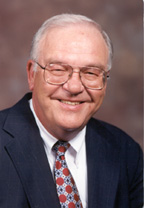 For his steadfast support of academic freedom, L. Dennis Smith, Ph.D., president of the University of Nebraska, has been named to receive the highly coveted American Association for the Advancement of Science (AAAS) 2002 Scientific Freedom and Responsibility Award.
For his steadfast support of academic freedom, L. Dennis Smith, Ph.D., president of the University of Nebraska, has been named to receive the highly coveted American Association for the Advancement of Science (AAAS) 2002 Scientific Freedom and Responsibility Award.
The award has been presented annually since 1980 to honor scientists and engineers whose exemplary actions have served to foster scientific freedom and responsibility.
Dr. Smith will be honored for his commitment to scientific freedom and responsibility, as demonstrated in 1999, when medical research being conducted at UNMC came under fire. The research, designed to shed light on neurodegenerative diseases such as Alzheimer’s, Parkinson’s, AIDS dementia and multiple sclerosis, relied on fetal tissue. State policymakers and religious leaders warned against using public funds for this research, and a bill was introduced in the legislature to ban the use of such tissue.
Defending scientific research
In response, Dr. Smith carefully outlined the critical need for the research. The request to cease the research, Dr. Smith wrote, “strikes at the very heart of academic freedom.” The Board of Regents subsequently voted unanimously to support the research. Dr. Smith continues to champion the right of scientists to pursue new knowledge in a responsible manner, and in a climate of academic openness.
“President Smith is truly deserving of this prestigious award,” said UNMC Chancellor Harold M. Maurer, M.D. “Through his strong leadership and example he set the tone for all biomedical research on this campus. We should all take personal pride in his award and salute his courage. With his encouragement we continue our efforts to find new treatments and cures for a variety of diseases.”
Dr. Smith also created the Nebraska Bioethics Advisory Commission, composed of a wide cross section of scientists and lay people, to develop guidelines for the ethical conduct of future biomedical research at the University of Nebraska.
“The ability to undertake legitimate research without external interference, including that from political and religious sectors, is fundamental to the excellence of our postsecondary institutions,” said Dr. Smith, whose studies some 30 years ago of cell division in frogs helped lay the groundwork for three researchers who ultimately won a Nobel Prize in medicine for identifying the entire cycle of a cell. “I am thankful and humbled that AAAS has honored me with this award,” he said.
Smith’s background
Dr. Smith became president of the University of Nebraska on March 1, 1994. Previously, he served as executive vice chancellor of the University of California at Irvine (1990-1994), and earlier, served on the faculty at Purdue University. He earned his Ph.D. in 1964 in experimental embryology, and his bachelor’s degree in 1959 in zoology and chemistry, from Indiana University.
Award honorees
The AAAS award recognizes scientists and engineers who have:
- acted to protect the public’s health, safety, or welfare; or
- focused public attention on important potential impacts of science and technology on society by their responsible participation in public policy debates; or
- established important new precedents in carrying out the social responsibilities or in defending the professional freedom of scientists and engineers.
About the AAAS
Founded in 1848, the American Association for the Advancement of Science, http://www.aaas.org, has worked to advance science for human well-being through its projects, programs and publications, in the areas of science policy, science education and international scientific cooperation. With more than 134,000 members from 130 countries and 272 affiliated societies comprising more than 10 million individual members, AAAS is the world’s largest federation of scientists. The association also publishes Science, an editorially independent, multidisciplinary, weekly peer-reviewed journal that ranks as one of the world’s most prestigious scientific journals.